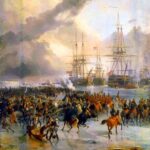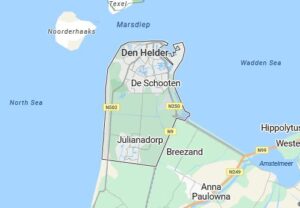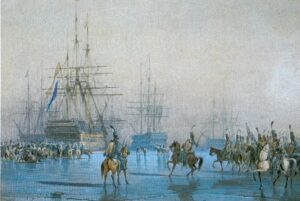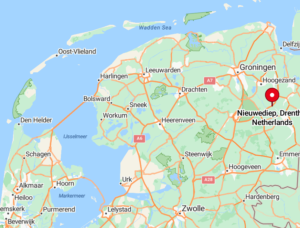
 Anytime a country, engaged in a war, can capture a ship belonging to their enemy, they will find themselves strategically in a better position than before, but to capture the entire fleet…now that can mean the difference between winning and losing the war. On January 23, 1795, at Den Helder, North Holland, Netherlands, an extremely rare occurrence took place when a French Revolutionary Hussar cavalry regiment came across a Dutch fleet at anchor in the Nieuwediep, just east of the town of Den Helder. While it was not unusual to come across ships at anchor, what is extremely rare is an interaction between warships and cavalry. One being on land and one on the water, usually prevented any interaction, since the men on horses couldn’t carry guns big enough to reach the ships under normal conditions. The difference in this situation was, of course, that the Dutch fleet was frozen at anchor, not simply sitting at anchor. They had no place they could go. The men on the Dutch fleet knew that they were “sitting ducks” with no recourse, so after some of the Hussars had approached across the frozen Nieuwediep, a negotiation began. It was decided that all 14 Dutch warships would remain at anchor. It was a pretty easy negotiation, because in reality, the Dutch fleet had no other choice. They were now prisoners of war and their capture had happened without violence or even a battle. In an extremely rare even the Dutch fleet was captured by the French Revolutionary Hussars on horseback.
Anytime a country, engaged in a war, can capture a ship belonging to their enemy, they will find themselves strategically in a better position than before, but to capture the entire fleet…now that can mean the difference between winning and losing the war. On January 23, 1795, at Den Helder, North Holland, Netherlands, an extremely rare occurrence took place when a French Revolutionary Hussar cavalry regiment came across a Dutch fleet at anchor in the Nieuwediep, just east of the town of Den Helder. While it was not unusual to come across ships at anchor, what is extremely rare is an interaction between warships and cavalry. One being on land and one on the water, usually prevented any interaction, since the men on horses couldn’t carry guns big enough to reach the ships under normal conditions. The difference in this situation was, of course, that the Dutch fleet was frozen at anchor, not simply sitting at anchor. They had no place they could go. The men on the Dutch fleet knew that they were “sitting ducks” with no recourse, so after some of the Hussars had approached across the frozen Nieuwediep, a negotiation began. It was decided that all 14 Dutch warships would remain at anchor. It was a pretty easy negotiation, because in reality, the Dutch fleet had no other choice. They were now prisoners of war and their capture had happened without violence or even a battle. In an extremely rare even the Dutch fleet was captured by the French Revolutionary Hussars on horseback.
Jean-Charles Pichegru was the leader of the French units…the 8th Hussar Regiment and the Voltigeur company of the 15th Line Infantry Regiment of the French Revolutionary Army, who had been assigned to invade the Dutch Republic. The Dutch fleet was commanded by captain Hermanus Reintjes. This rare event took place during the War of the First Coalition, which was part of the French Revolutionary Wars. The little town of Den Helder is located at the tip of the North Holland peninsula, south of the island of Texel, near the shallow Zuiderzee bay (which means Southern Sea). The Zuiderzee was closed off and partly drained in the 20th century, and what is left of it now forms the freshwater IJsselmeer.
Nevertheless, in the fall of 1794, during the War of the First Coalition of the French Revolutionary Wars, the area was the site of one of the most bizarre captures in history. That day, the Dutch proclaimed the Batavian Republic, effectively ending the war with France and allying itself with France instead. Suddenly, the French were no longer enemies of the Dutch, which seems like a good move in light of the capture. Nevertheless, there were those among the Dutch Navy and the army there who remained loyal to the Stadtholder, and there were fears that Navy ships from Den Helder might sail for England to rejoin William V, Prince of Orange. For that reason, the new Batavian interim Government issued orders to all its fleets at Vlissingen, Hellevoetsluis and at Den Helder, not to fight against the French if they appeared, and to keep the ships at anchor to make sure they could be ready to defend the new Republic against the British.
This event might not have been possible, were it not for the fact that the winter of 1794–1795 was exceptionally cold, causing the Zuiderzee to freeze. Pichegru saw an opportunity and ordered General of Brigade Jan Willem de Winter to lead a squadron of the 8th Hussar Regiment to Den Helder. De Winter had been serving with the French since 1787 and would later command the Dutch fleet in the disastrous Battle of Camperdown. So, while he was successful in one operation, he might not have been the best leader in the long 
 run. Still, the operation was carried out with no casualties. The French simply received the assurance from the Dutch captain that the vessels and their crews would remain at anchor until the political situation in the Dutch Republic would have become clear. The situation was finally settled in May 1795 under the Treaty of The Hague, when the Batavian Republic officially became a French ally. Now, its ships would serve a common cause.
run. Still, the operation was carried out with no casualties. The French simply received the assurance from the Dutch captain that the vessels and their crews would remain at anchor until the political situation in the Dutch Republic would have become clear. The situation was finally settled in May 1795 under the Treaty of The Hague, when the Batavian Republic officially became a French ally. Now, its ships would serve a common cause.


Leave a Reply